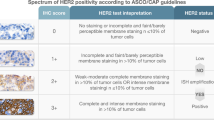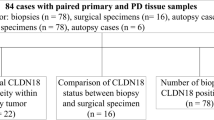Abstract
Purpose
Little is known about the use of first-line chemotherapy in clinical practice in patients with advanced esophagogastric adenocarcinoma, and no data have been published regarding potential obstacles for the implementation of molecular testing for targeted agents in this patient group. Here, we sought to evaluate factors influencing treatment decisions with special focus on the implementation of HER2 testing during the first year after trastuzumab market approval in Germany.
Methods
A total of 754 patients undergoing treatment decisions for palliative first-line therapy in 2010 were documented using Therapiemonitor®. Drug use and intensity of first-line treatment were analyzed. Data on HER2 testing and test algorithm are described, and variables influencing HER2 testing were selected using bivariate analysis. Significant factors were included in a multivariate logistic regression analysis.
Results
Compared with previous years, treatment intensity has further increased. The use of chemotherapy triplets rose from 10.1 % in 2006 to 60.3 % in 2010. In 2010, 49.1 % of patients were tested for HER2 and in 52.2 % of these patients the currently proposed test algorithm was used. Using multivariate logistic regression analysis age ≥67 years and “initiating institution: practice” were found to negatively impact the likelihood of HER2 testing, while treatment goal “prevention of progression”, multiple metastases and a Karnofsky status >80 % showed positive correlation with HER2 testing.
Conclusion
The tendency to use more intensive first-line chemotherapy regimens in patients with advanced esophagogastric adenocarcinoma continued in 2010. Only a minority of patients had an access to the appropriate molecular diagnostics and therefore to treatment with trastuzumab. The access was limited due to the preselection following individual, clinical and institutional factors.




Similar content being viewed by others
References
Ajani JA, Moiseyenko VM, Tjulandin S (2007) Quality of life with docetaxel plus cisplatin and fluorouracil compared with cisplatin and fluorouracil from a phase III trial for advanced gastric or gastroesophageal adenocarcinoma: the V-325 Study Group. J Clin Oncol 25(22):3210–3216
Al-Batran SE, Ajani JA (2010) Impact of chemotherapy on quality of life in patients with metastatic esophagogastric cancer. Cancer 116(11):2511–2518
Al-Batran SE, Hartmann JT, Hofheinz R et al (2008a) Biweekly fluorouracil, leucovorin, oxaliplatin, and docetaxel (FLOT) for patients with metastatic adenocarcinoma of the stomach or esophagogastric junction: a phase II trial of the Arbeitsgemeinschaft Internistische Onkologie. Ann Oncol 19(11):1882–1887
Al-Batran SE, Hartmann JT, Probst S et al (2008b) Phase III trial in metastatic gastroesophageal adenocarcinoma with fluorouracil, leucovorin plus either oxaliplatin or cisplatin: a study of the Arbeitsgemeinschaft für Internistsiche Onkologie. J Clin Oncol 26:1435–1442
Al-Batran SE, Homann N, Hartmann JT et al (2009) 5-Fluorouracil, leucovorin, oxaliplatin with or without docetaxel in older adult patients with esophagogastric cancer: preliminary results from the FLOT 65+ trial of the Arbeitsgemeinschaft Internistische Onkologie (AIO). Onkologie 32(suppl 4):1–254 (page 135)
Ananiev J, Gulubova M, Manolova I, Tchernev G (2011) Prognostic significance of HER2/neu expression in gastric cancer. Wien Klin Wochenschr 123(13–14):450–454
Bang YP (2009) J Clin Oncol 27 (suppl.) ASCO abstr p 4556
Bang YJ, Van Cutsem E, Feyereislova A et al (2010) Trastuzumab in combination with chemotherapy versus chemotherapy alone for treatment of HER2-positive advanced gastric or gastro-oesophageal junction cancer (ToGA): a phase 3, open-label, randomised controlled trial ToGA Trial Investigators. Lancet 376(9742):687–697
Cunningham D, Starling N, Rao S et al (2008) Capecitabine and oxaliplatin for advanced esophagogastric cancer. N Engl J Med 358:36–46
Ferlay J, Bray F, Pisani et al (2004) GLOBOCAN 2002—Cancer incidence, mortality and prevalence worlwide, version 2.0
Grabsch H, Sivakumar S, Gray S, Gabbert HE, Müller W (2010) HER2 expression in gastric cancer: Rare, heterogeneous and of no prognostic value—conclusions from 924 cases of two independent series. Cell Oncol 32(1–2):57–65
Hofheinz RD, Al-Batran SE, Ridwelski K, Görg C, Wehle K, Birth M, Fetscher S, Scheiber H, Lukan N, Lordick F (2010) Population-based patterns of care in the first-line treatment of patients with advanced esophagogastric adenocarcinoma in Germany. Onkologie 33(10):512–518
Höhler T, Rüschoff J, Ridwelski K, Moehler M (2010) HER2 testing and targeted therapy in advanced gastric cancer. Onkologie 33(Suppl 4):26–30
Kang YK, Kang WK, Shin DB et al (2009) Capecitabine/cisplatin versus 5-fluorouracil/cisplatin as first-line therapy in patients with advanced gastric cancer: a randomised phase III noninferiority trial. Ann Oncol 20:666–673
Kleinbaum DG, Kupper LL, Muller KE, Nizam A (1998) Applied regression analysis and other multivariable methods. Duxbury Press
Moehler M, Al-Batran SE, Andus TZ et al (2011) German S3-guidelines: Diagnosis and treatment of esophagogastric cancer. Gastroenterol 49(4):461–531
Rüschoff J, Dietel M, Baretton G, Arbogast S, Walch A, Monges G, Chenard MP, Penault-Llorca F, Nagelmeier I, Schlake W, Höfler H, Kreipe HH (2010) HER2 diagnostics in gastric cancer-guideline validation and development of standardized immunohistochemical testing. Virchows Arch 457(3):299–307
Rüschoff J, Hanna W, Bilous M, Hofmann M, Osamura RY, Penault-Llorca F, van de Vijver M, Viale G (2012) HER2 testing in gastric cancer: a practical approach. Mod Pathol. doi:10.1038/modpathol.2011.198
Shen L, Kang YK, Lichinitser M et al (2011) Health-related quality of life in patients with HER2-positive advanced gastric or gastro-oesophageal junction cancer with high HER2 expression levels: Exploratory analysis of the Phase III ToGA study. Eur J Cancer 47:S231–S232
Van Cutsem E et al (2006) Phase III study of docetaxel and cisplatin plus fluorouracil compared with cisplatin and fluorouracil as first-line therapy for advanced gastric cancer: a report of the V325 Study Group. J Clin Oncol 24:4991–4997
Wagner AD, Grothe W, Haerting J et al (2006) Chemotherapy in advanced gasric cancer: a systematic review and meta-analysis based on aggregate data. J Clin Oncol 24:2903–2909
Acknowledgments
The authors are indebted to all participating institutions in the Therapiemonitor 2010. Therapiemonitor was supported by grants of Roche Pharma AG Grenzach-Wyhlen, Germany. Roche Pharma AG had no influence on data acquisition and analysis nor on the writing of the manuscript and on the decision to submit it for publication. All authors received documentation fees or honoraria from O.I.S.
Conflict of interest
No other conflicts of interest have to be declared.
Author information
Authors and Affiliations
Corresponding author
Rights and permissions
About this article
Cite this article
Gencer, D., Al-Batran, SE., Dada, R. et al. Metastatic esophagogastric adenocarcinoma: trends in first-line treatment and predictive factors for the implementation of HER2 testing in clinical practice during the first year after trastuzumab market approval. J Cancer Res Clin Oncol 139, 337–345 (2013). https://doi.org/10.1007/s00432-012-1335-7
Received:
Accepted:
Published:
Issue Date:
DOI: https://doi.org/10.1007/s00432-012-1335-7




